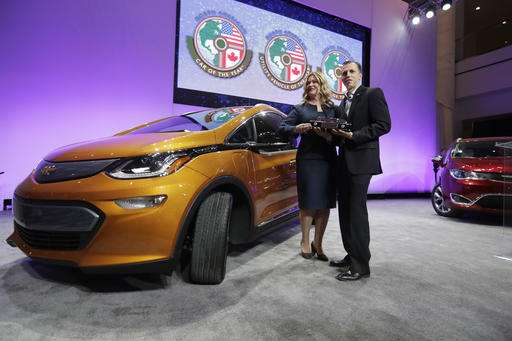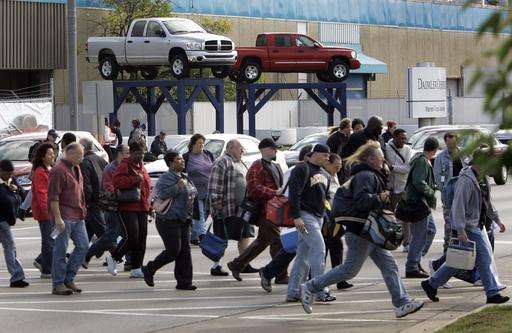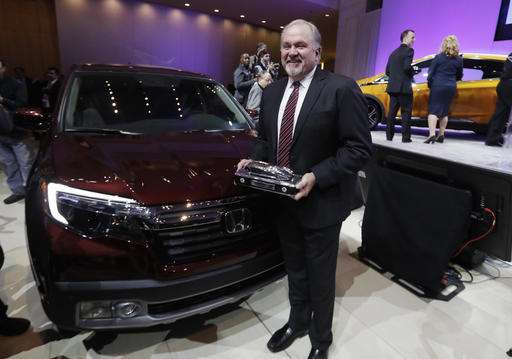The Latest: Volvo testing self-driving cars with real people

The Latest from the annual North American International Auto Show in Detroit (all times local):
3:37
Volvo Cars is putting real people into its self-driving cars to better learn how they're used. Volvo said Monday it has chosen the first of around 100 families who will use its self-driving cars around Gothenburg, Sweden, starting this year. Volvo wants to see when people engage and disengage the autonomous driving capabilities and what sorts of things they like to do when the car is driving itself. Volvo plans to expand the program to London and China, and eventually to the U.S. Volvo Cars CEO Håkan Samuelsson said it's important to engage real people in the development of Volvo's self-driving cars, which it expects to sell by 2021. "If this is going to be a commercial product, it has to be a credible product that people trust," he said.
1:20
A top General Motors executive says he sees no reason for the company to make a big jobs and factory investment in order to please President-elect Donald Trump.
Trump has criticized GM, Ford and Toyota for making cars in Mexico and exporting them to the U.S. He has threatened border taxes if the companies don't keep jobs here. Ford made Trump happy by canceling a planned small-car factory in Mexico and announcing 700 jobs in Michigan, although it will still build small cars south of the border. On Sunday, Fiat Chrysler announced it would add 2,000 jobs in Ohio and Michigan to make three new Jeeps.
"We're keeping it all in perspective," General Motors product development chief Mark Reuss said in an interview at the Detroit auto show Monday. "He (Trump) is trying to build jobs and (factory) capacity and the economy in the United States. That's a great thing. We all want the United States to succeed and we all want to work with him on that."
But Reuss said decisions on where to build vehicles were made as many as five years ago. He said the company has invested billions in the U.S. since the 2008 economic downturn and has thousands of employees here. "I'm proud of that record. We'll just keep it going."
1:10
Even though the shift from cars to SUVs is accelerating in the U.S. and worldwide, General Motors product development chief Mark Reuss says the car isn't going to die.
Reuss says people like him, at the end of the baby boomer demographic group, are becoming empty nesters and won't be needing the SUV's space and utility for very long. He doesn't see the SUV boom reversing itself, but he says there will be a shift back toward cars as demographics change.

"I do think there's a shift that will come, that you'll still see cars because I don't need to carry three kids in it anymore and I enjoy driving a car," he said. "A really good car that you enjoy getting into, that's very different than driving an SUV, is still very, very true."
Some cars have as much interior room as larger SUVs, plus they're nice to drive on the highway, said Reuss.
Five years ago, midsize cars made up 15.8 percent of U.S. auto sales, according to IHS Markit. This year the market share fell more than three percentage points to 12.5. During the same five years, small SUVs rose from 12.7 percent of U.S. sales to 18.7 percent.
12:10
The CEO of Fiat Chrysler Automobiles says the auto industry will have to adapt to the tactics of President-elect Donald Trump.
"This is new territory for most of us. None of us have had a tweeting president before," Sergio Marchionne said during a round table with reporters at the Detroit auto show.
Marchionne said his company's decision, announced Sunday, to invest $1 billion in two U.S. auto plants and create 2,000 jobs to build new Jeep vehicles was in the works for a while and wasn't influenced by Trump. Still, Trump took to Twitter Monday to congratulate the automaker.
Trump has threatened to impose a border tax on vehicles made in Mexico and shipped to the U.S. in an effort to force companies to build cars in the U.S. Fiat Chrysler has been searching for a partner to build its small cars while it focused on making bigger vehicles like Jeeps. Marchionne said he needs more information on the tax before choosing a partner.
"I need clarity. I think we all need clarity," he said.
11:40
Ford Motor Co. has confirmed that the Ranger small pickup and Bronco SUV will be returning to the U.S. market. The Bronco was made between 1966 and 1996; Ford Chairman Bill Ford says he had one when he got his driver's license. Ford killed it when sales started slumping. But with low gas prices boosting SUV sales and the huge success of the Jeep brand, Ford will bring the 4x4 back in 2020. Ford still sells the Ranger outside the U.S., but stopped selling it here in 2011 when sales of smaller pickups were hurting. Now, pickups are back, and the Ranger will go on sale here in 2019. Both vehicles will be made at a plant outside Detroit.

9:45
President-elect Donald Trump is touting decisions by Fiat Chrysler and Ford Motor Co. to expand plants and create new jobs in the U.S., as the auto industry gathers for its annual show in Detroit.
Fiat Chrysler said Sunday it will invest $1 billion in two U.S. factories to build three new Jeep vehicles, including a pickup truck. The expansion will create 2,000 new jobs. Ford last week scrapped plans to build a $1.6 billion small-car factory in Mexico, and said $700 million would go toward expanding a Michigan plant to build new electric and autonomous vehicles.
Trump has criticized the industry's strategy of building cars in Mexico and then shipping them to the U.S. He has threatened a 35 percent border tax and said the cars should be built in the U.S. by American workers.
On Monday, Trump tweeted "it's finally happening," and thanked Ford and Fiat Chrysler for the investments in the U.S.
At the show, executives from General Motors and Volkswagen said they have no plans to change production plans despite the Trump border tax threat.
9:10 a.m.
The Chevy Bolt from General Motors has snagged the annual award for the top car in North America.
Mark Reuss, GM's head of global product development, describes the Bolt as a "moon shot." Reuss says the car's developers weren't sure what kind of range and price they would end up with when they started the project, but everything turned out just right. The Bolt gets more than 200 miles per battery charge, which is more than the average American drives in a day, and sells for around $30,000 when a federal tax credit is included.
The Honda Ridgeline was named truck of the year, while the Pacifica minivan from Fiat Chrysler won the award for as top utility vehicle, the first time an award was given separately for that category.
© 2017 The Associated Press. All rights reserved.



















